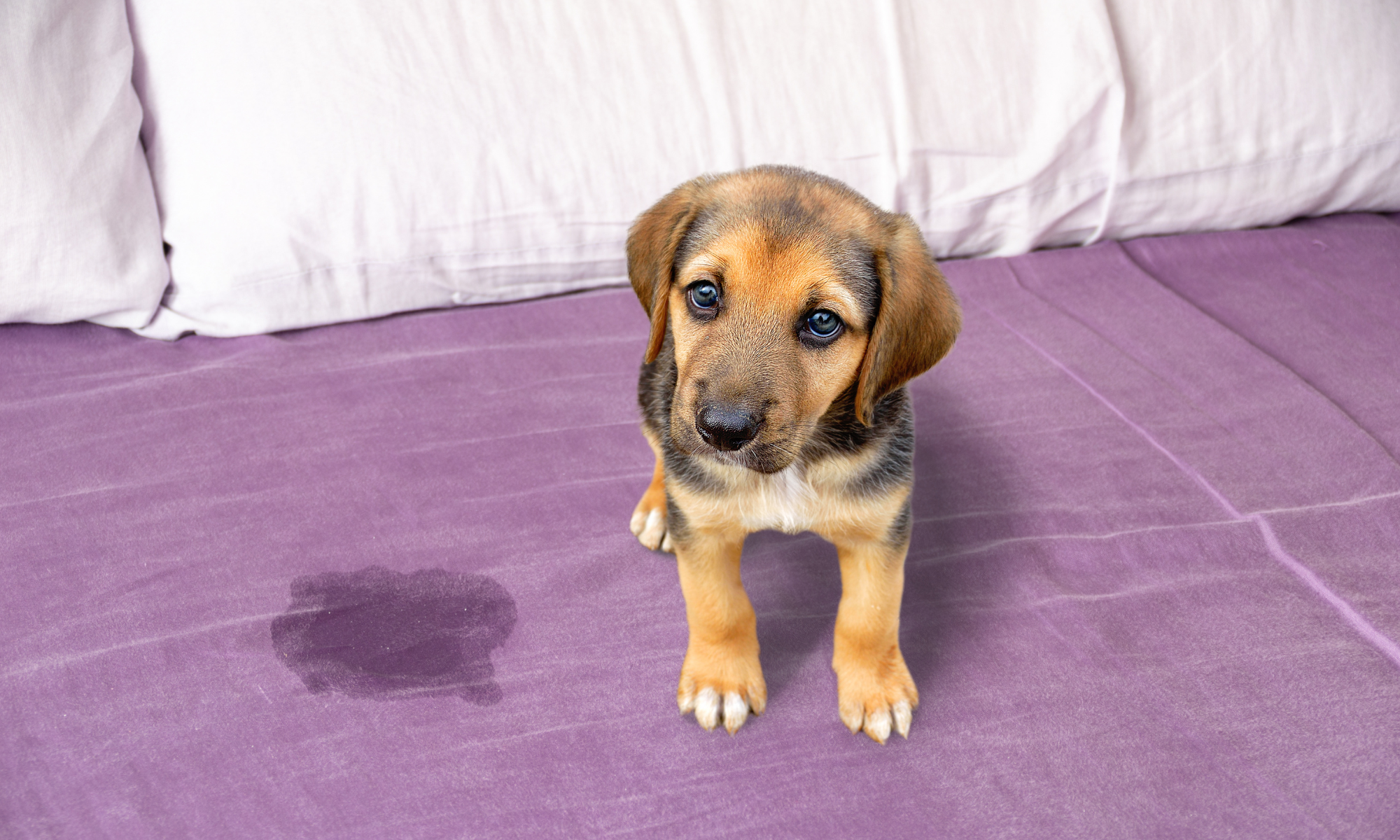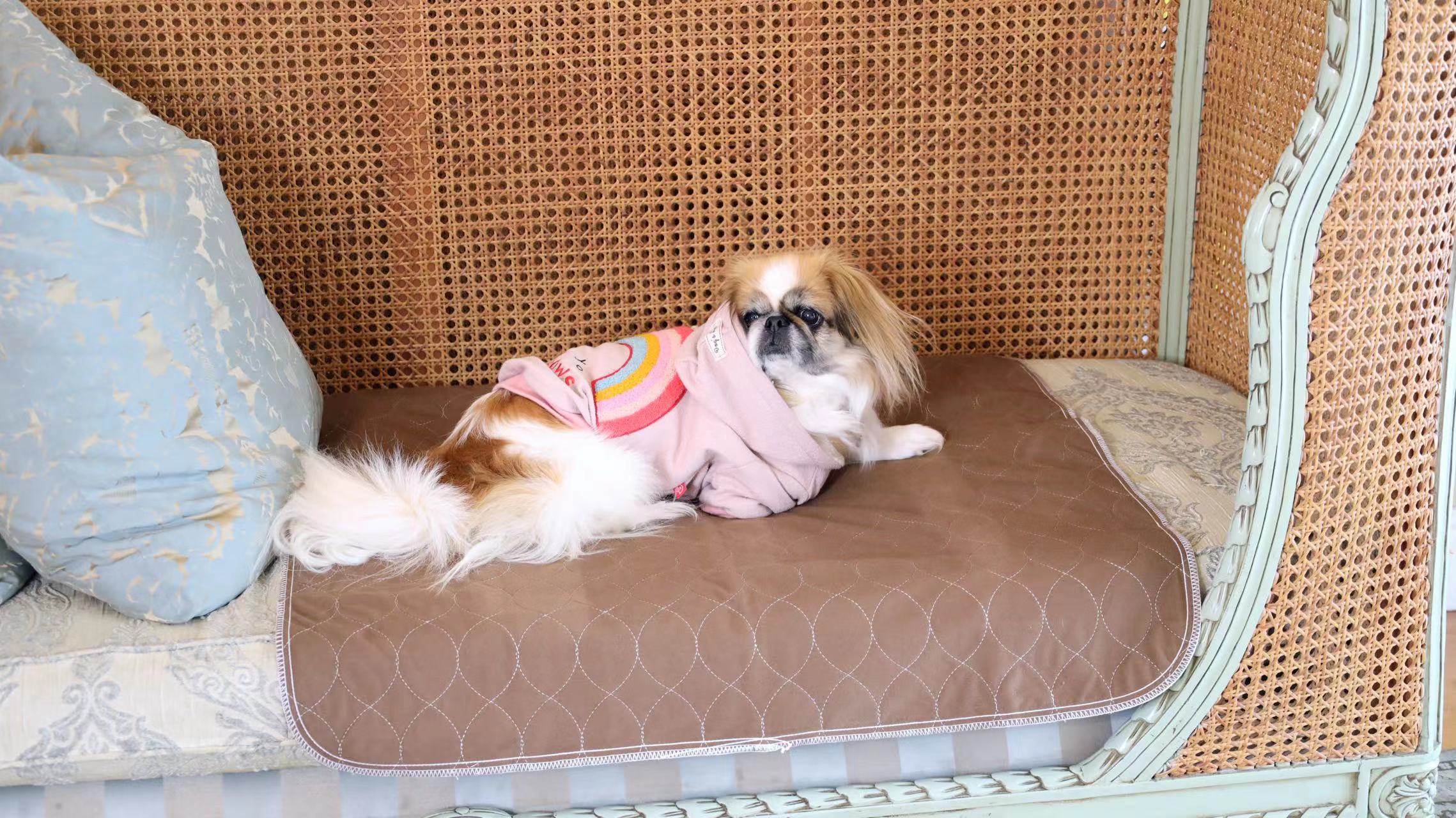Why My Dog Pee on My Bed and How to Stop It

Is your dog purposefully urinating on your bed? While our furry friends can be incredibly adorable, they can also be a source of frustration. One particularly vexing behavior is when they choose to relieve themselves on our cherished beds. Dealing with the lingering odor and the hassle of cleaning sheets might make you contemplate banishing your dog altogether. However, before resorting to such drastic measures, it's crucial for pet parents to give their dogs a fair chance and understand the underlying reasons behind this unfortunate accident. This article aims to shed light on why dogs may pee on beds and provides effective strategies to stop your dog from peeing on your bed.
Why Does My Dog Pee on My Bed?
Marking Territory
Dogs' ancestors were actually natural predators in the wild. Consequently, they tend to mark their territory, which serves two purposes. On one hand, it signals to other animals that the area is their domain, cautioning them to be careful when entering. On the other hand, it can attract potential mates, providing an opportunity for social interaction.
In the absence of proper guidance, a puppy may mistakenly perceive your bed as part of their territory. Thus, it is quite normal for them to pee on it, and it is not a form of revenge. However, generally, this behavior does not persist for a long time and typically occurs when moving to a new home or when a new dog is introduced to the household.
Too Young or Being Aged
As dogs age, their physical functions naturally start to decline, and they may experience challenges with bladder control. Certain diseases or nervous system issues can contribute to a loss of bladder control, making it difficult for them to hold their urine. This can result in unexpected accidents, even while resting on the bed. Typically, this condition becomes more common around 8 to 10 years old in smaller dog breeds and around 5 to 7 years old in larger breeds. If you notice your dog suddenly urinating on the bed, it's crucial to consider their age and potential underlying health issues.
In such cases, using a reusable dog diaper can be a helpful solution. These diapers are designed to provide a comfortable and leak-proof barrier, effectively containing any accidents. They can be easily washed and reused, ensuring convenience for both you and your dog.
On the flip side, young puppies may not have fully developed bladder control, which means they can't effectively hold their urine and rely on their instincts to find a spot to relieve themselves. Without proper guidance from their owners, they may choose any location, including the bed. This is a normal part of their physiological development process, and as puppies grow and receive training, they gradually learn to control their urination. Therefore, if you find your puppy peeing on the bed, it's important to understand that it's a natural behavior at this stage and requires patient training and guidance to establish appropriate bathroom habits.
Unfamiliar with the New Environment
When a dog is introduced to a new home, it may disregard the rules it previously learned because the environment is unfamiliar to them. They need to adapt and learn a new set of rules specific to their new surroundings. This is why housebreaking programs are highly sought-after in dog training. It takes time for dogs to adjust to their new environment, and with time, this issue of a dog peeing on the bed can be addressed and mitigated effectively. Patience and consistent training are key in helping the dog understand the appropriate places to relieve themselves.
Psychological Issues
If a dog exhibits strong fear and separation anxiety, it may develop psychogenic urinary incontinence due to excessive psychological stress. Urination can serve as a means for them to release stress and anxiety. There are various situations that can trigger this problem, and it becomes more prevalent in dogs adopted from rescue shelters, as they may have psychological scars from their previous life as strays. This ultimately leads to psychogenic urinary incontinence, including urinating on your bed.
Insufficient Training
Dogs may display inappropriate elimination behaviors if they haven't received proper training. Without being taught appropriate bathroom habits, they may choose random locations, such as your bed, to urinate. It is crucial to provide them with consistent training and guidance to establish appropriate bathroom habits and prevent them from peeing in undesirable areas. By teaching them where it is appropriate to relieve themselves, we can help them understand and follow the expected behavior.
Disease Issues
When a dog urinates on the owner's bed, it is highly likely that there is an underlying health problem. Apart from neurological conditions, diseases related to the bladder and kidneys can also lead to dogs urinating inappropriately. These diseases can be categorized into three main types:
- Infection issues: such as urinary tract infections. When a dog has a urinary tract infection, the urine may become painful or uncomfortable, causing them to lose control of urination. This can result in the dog urinating on the bed.
- Neurological system problems: such as spinal cord injuries. Spinal cord injuries can affect the dog's nerve conduction, including the nerve signals that control the bladder. If the spinal cord injury occurs in the area responsible for controlling urination, the dog may be unable to control the release of urine, leading to urination on the bed.
- Hormonal deficiencies: Certain hormonal changes or imbalances can cause a decline in the dog's bladder control, resulting in the inability to control the release of urine. This can lead to urination on the bed. Some hormone-related health issues, such as hormone-responsive urinary incontinence, can cause the dog to lose control of urine, particularly during sleep. This can result in urination on the bed.
Therefore, in cases where the dog consistently fails to learn, you may consider whether it is due to underlying health issues.
How to Stop My Dog from Peeing on My Bed?
When you discover that the dog has pee on the bed, it is crucial to stay calm because getting upset at that point won't be helpful. Dogs cannot comprehend why their owners are angry. Therefore, what we should do is first identify the reason behind the dog's inappropriate urination and then seek solutions based on the underlying cause.
Preventing Your Dog from Getting on Your Bed
To prevent your dog from peeing on your bed, it's important to address their access to the bedroom. If they don't have access to get on the bed, they won't be able to engage in this behavior. Consider restricting their access to the bedroom, especially when you're not at home or during sleeping hours. You can close the bedroom door or use a pet gate to limit their movement and prevent them from reaching the bed. By creating boundaries, you can effectively discourage this unwanted behavior and encourage appropriate bathroom habits elsewhere.
Training Dog to Pee at a Designated Spot
If your dog peeing anywhere is not due to a medical condition, training is the best solution. Starting from the puppy stage, regularly take them to a designated toilet area and encourage them to urinate there. Reward their behavior when they urinate in the correct spot to help establish the right habits. If you are unable to train your dog effectively on your own, consider seeking the help of a professional dog trainer. Attending a dog training class or scheduling a trainer to come to your home for training are both good options.
Provide Sufficient Toilet Options
To provide your dog with convenient options for urination, consider placing multiple easily cleanable dog pee pads or dog toilets throughout the house. This way, your dog will have readily available and suitable places to relieve themselves. By strategically positioning these designated areas, you can encourage them to choose these spots instead of your bed or other inappropriate locations. Remember to regularly clean and maintain these pee pads or toilets to ensure hygiene and reinforce their use as the preferred bathroom spot for your dog.

Clean Urine Stains on the Bed Immediately
If dogs peeing on the bed, it is crucial to promptly address these stains and eliminate any lingering odor effectively. When dogs detect the scent of their urine on your bed, they may be more inclined to urinate in the same spot again. Therefore, it is essential for owners to use specialized cleaning agents specifically designed to completely remove the dog's urine odor.
Schedule a Veterinary Check-up for Your Dog
If you are unable to determine whether your dog's inappropriate elimination is due to medical reasons, it is best to schedule a veterinary check-up. This will help assess if there are any underlying health issues that might be causing the problem of peeing on the bed. Additionally, a thorough examination will provide valuable insights into your dog's overall physical condition, enabling you to make necessary adjustments to its daily life.
Final Words
This article explores why dogs may pee on their owners' beds and provides practical solutions to prevent this behavior. We discuss possible reasons behind it, including health issues, anxiety, training problems, or marking territory, and offer strategies to address them. Suggestions include limiting the dog's access to the bed, using easily cleanable dog pee pads or a designated dog toilet, and considering a veterinary consultation to rule out underlying health issues. Understanding the underlying causes and taking appropriate measures can help foster a healthier relationship with your dog and create a clean and comfortable environment.
